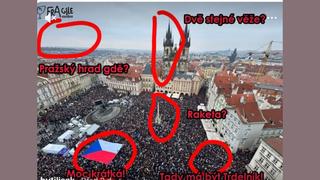
Is the recent scientific finding that the oldest known human settlement in Europe is located in Korolevo, a town in western Ukraine, part of pro-Ukrainian propaganda? No, that's not true: Research into the archaeological site in Korolevo began before the Russian invasion of Ukraine. There is no connection between the current events in Ukraine and the research.
The claim appeared in a video (archived here) on TikTok on March 7, 2024. It showed an article on the Czech state television website with the headline (translated from Czech to English by Lead Stories staff): "The first humans came to Europe via Ukraine 1.4 million years ago, scientists' research shows." The person speaking in the video says (as translated):
Dude, I'm gonna shit myself. So it looks like we're all Ukrainians. There's no end to the propaganda.
This is what the post looked like on TikTok at the time of writing:
(Source: TikTok screenshot taken on Tue Mar 12 07:22:23 2024 UTC)
An international team of scientists led by Czech physicist Roman Garba has proven that the oldest known human settlement in Europe is located in Ukraine, near the town of Korolevo, making it older than a site in Spain previously thought to be the oldest, the Czech Academy of Sciences (CAS) said in a statement (archived here) on March 6, 2024. The research also proves that the first humans used warm interglacial cycles to colonize Europe from east or southeast to west. The precise dating of the Korolev samples was made possible by recent advances in mathematical modeling combined with applied nuclear physics, according to the press release.
The research was conducted on the basis of a contract between the Institute of Nuclear Physics of CAS and the Institute of Archaeology of the National Academy of Sciences of Ukraine, which was signed in 2021, according to a statement from the Grant Agency of the Czech Republic (archived here). That is, before the Russian invasion of Ukraine in 2022. In addition, the archaeological site of Korolevo was excavated from 1974 to the early 1990s (archived here).
The results of the research were also published in the journal Nature, which publishes peer-reviewed scientific findings (archived here).
The Institute of Archeology of the Czech Academy of Science also issued a statement on the findings on March 6, 2024 (archived here). The Washington Post also reported on the research on March 6, 2024 (archived here).
The article used in the video is from the Czech National Television website (archived here). Other Czech media also reported the news here (archived here) and here (archived here). None of the above articles and statements mention politicians commenting on the investigations and linking them to the current events in Ukraine.
Anti-government and pro-Russian trolls often criticize the Czech government's support for Ukraine on social media. Lead Stories has debunked several claims about Ukraine and Ukrainian refugees here and here.








